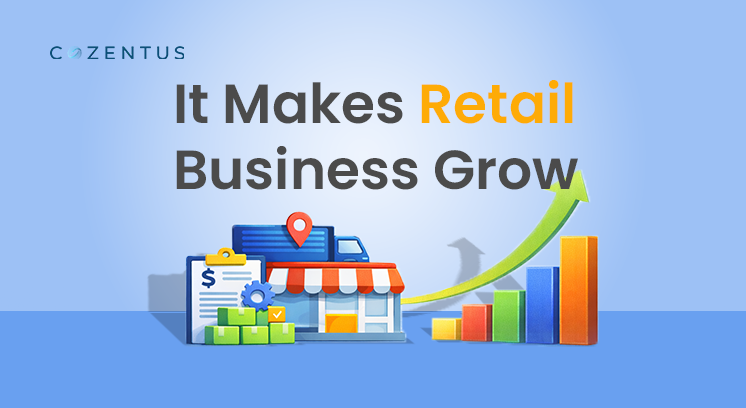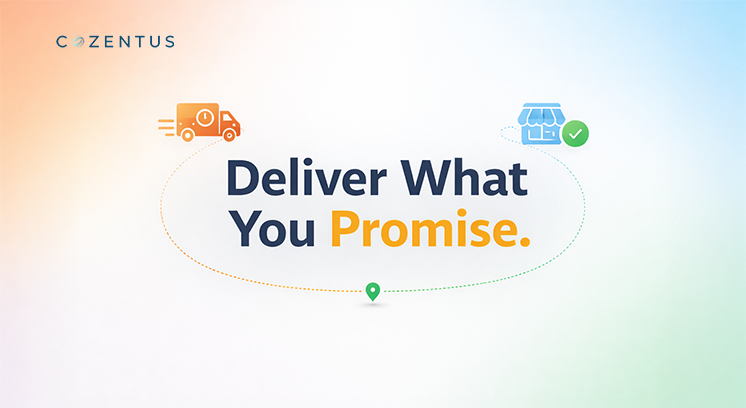Logistics Leaders Are Making This Shift
Across boardrooms and strategy meetings, one question keeps surfacing: “Should we continue relying on SaaS platforms, or build solutions that truly fit our business?”
For years, the “buy, don’t build” mindset was there. Ready-made SaaS tools promised faster rollouts, predictable costs, and instant scalability. But logistics leaders are beginning to question whether those promises still hold up, especially in an environment where operational complexity, data silos, and competitive pressures keep increasing.
At Cozentus, we have seen a growing number of logistics organizations, from freight forwarders and ports to 3PLs and large enterprises, shift from SaaS to custom-built technology. These companies want systems that align with their unique workflows, integrate deeply across partners, and evolve with their business.
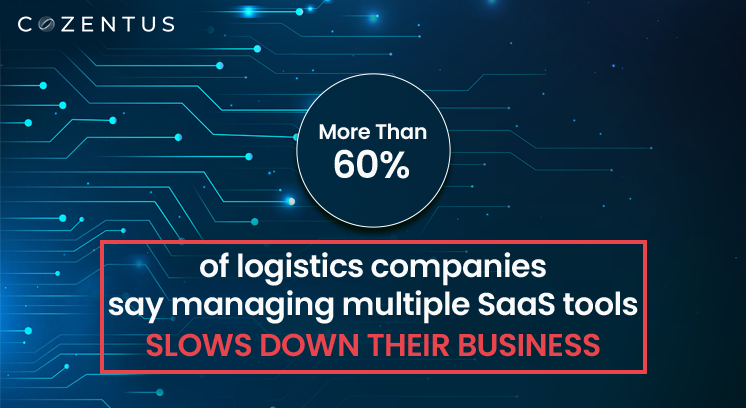
7 Reasons Why Logistics Leaders Are Now Choosing Custom-Built Applications
Logistics leaders are now thinking about how to add technology that will support their business. Instead of relying on generic SaaS tools, most of them are choosing custom-built applications for their operations. Here are 7 reasons why:
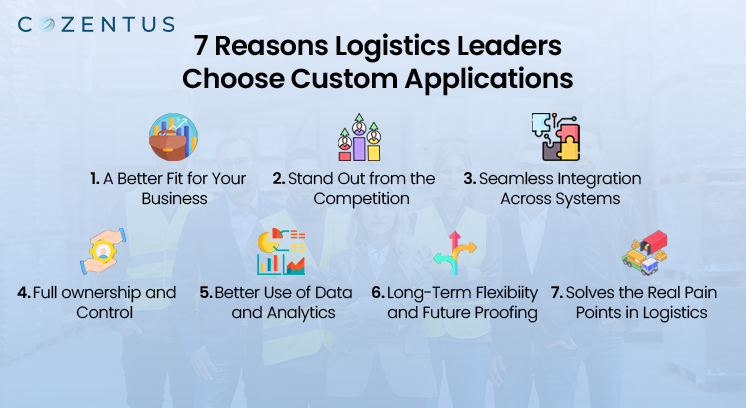
1. A Better Fit for Your Business
Every logistics business is different. Standard SaaS platforms are built to serve the average company, not yours.
A custom solution is designed specifically around your workflows. Whether it is shipment visibility, risk monitoring, or intelligent document processing (IDP), custom-built tools can match your operations precisely.
This will lead to higher adoption rates, fewer manual workarounds, and smoother collaboration across teams. When systems feel native to your business, people actually enjoy using them, and performance follows.
2. Stand Out from the Competition
Using the same SaaS system as everyone else often leads to similar results. In logistics, where margins are tight and efficiency matters a lot, having the same outcomes is not an advantage.
Custom solutions give you room to innovate. You can design analytics that fit your KPIs, automate complex processes that others cannot, and build experiences your customers will notice.
For example, Cozentus clients have created their own predictive ETA models, tailored carrier dashboards, and data-driven performance metrics that no generic SaaS could provide out of the box.
3. Seamless Integration Across Systems
No logistics operation runs on a single platform. You probably rely on a combination of ERP, TMS, WMS, yard management tools, carrier portals, and customer systems. Getting these to talk to each other is often where SaaS solutions fall short.
A custom build gives you full integration flexibility. Cozentus offers this through robust APIs, data engineering, and cloud and DevOps expertise. This ensures that every part of your tech stack communicates with each other smoothly.
When your systems are connected, you get a single view of shipments, documents, and performance across the entire supply chain. You also reduce data silos and manual reconciliations that often slow down decision-making.
4. Full Ownership and Control
When you buy SaaS, you are actually renting someone else’s software. You depend on their roadmap, their data policies, and their pricing decisions.
With a custom solution, you own it. You decide when to update, what to add, and how to scale. You maintain full control of your intellectual property (IP) and data security, both of which are highly important in logistics.
We can help you design architectures that you can fully control and that can evolve independently. This type of ownership gives logistics leaders confidence that their technology strategy will not be disrupted by vendor changes or license issues.
5. Better Use of Data and Analytics
Data is one of the most powerful assets a logistics business has, but only if you can understand and use it properly.
Off-the-shelf SaaS dashboards can show metrics, but they rarely show your KPIs, your logic, or the level of detail logistics operations demand.
The best bet is to build custom analytics and AI-driven insights through data engineering, visualization, and machine learning. Whether it is lane-specific cost forecasting, predictive risk alerts, or multi-carrier performance tracking, these tools give leaders the data they can use to impress their clients.
With the right data strategy, logistics decisions move from reactive to proactive. That is where transformation truly begins.
6. Long-Term Flexibility and Future Proofing
The logistics industry never stays still. Every year, there are new trade regulations, sustainability mandates, customer expectations, and technologies.
A custom platform evolves with you. You can adapt quickly, integrate new partners, or extend capabilities without waiting for a vendor’s next update cycle.
With flexible and modular architectures, logistics companies can respond very quickly. This might mean automating new document flows, expanding visibility into new regions, or integrating AI models to optimize operations.
Future-proofing your systems means staying relevant in a market that is constantly changing.
7. Solve the Real Pain Points in Logistics
The biggest frustrations we hear from logistics leaders are consistent: lack of visibility, manual documentation, disconnected systems, and rising compliance risks.
Custom solutions directly address these issues. At Cozentus, our logistics-focused services solve them from the front:
- Shipment Visibility: Real-time tracking across carriers, routes, and customers.
- Risk Monitoring: Early alerts for potential disruptions or exceptions.
- Intelligent Document Processing (IDP): Automated Bill of Lading, invoicing, and customs documentation.
- Process Automation: End-to-end workflows that remove repetitive tasks and improve accuracy.
By aligning technology tightly with business requirements, logistics teams can achieve substantial gains in efficiency, accuracy, and customer satisfaction.
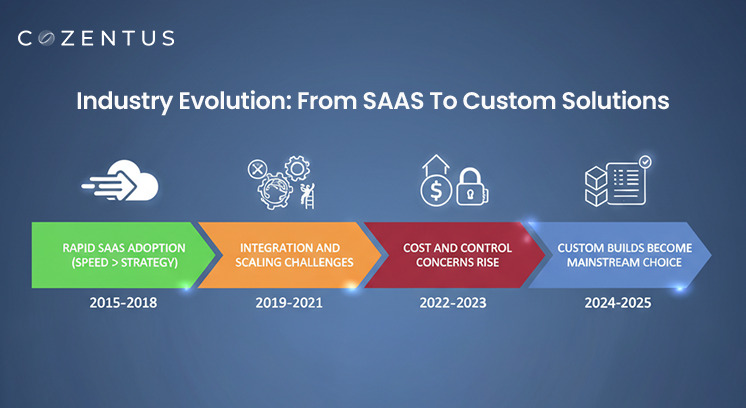
Does This Mean SaaS is Dead?
Custom is not always the only answer.
If your processes are fairly standard or if you need to move quickly with minimal investment, SaaS can still serve you well. It is fast to implement, easier to maintain, and requires less technical oversight.
Some of our clients even use a hybrid model, adopting SaaS for standard capabilities while building custom extensions for data integration, analytics, or automation. This approach delivers both agility and control.
The right choice depends on your business goals, not a single rule.
You should also read this: What Top Freight Operators Are Automating in 2025 (And What They’re Not)
How to Decide: Build, Buy, or Both?
Choosing the right approach starts with a clear understanding of your needs and resources.
Here is a simple framework:
- Define what is strategic: Identify functions that create advantage, not just necessity.
- Evaluate SaaS vendors: Can they meet your key needs without complex workarounds?
- Assess your capability: Do you have or can you acquire the skills to build and maintain?
- Compare total value: Consider ownership, scalability, and long-term ROI, not just cost.
- Partner wisely: Choose a technology partner with real logistics domain expertise.
Sometimes, the smartest strategy is to blend both worlds.
Final Thoughts: Custom or SaaS?
The question is not just “Custom or SaaS?” It is “What will best serve your business over the next 5 - 10 years?”
If you are looking for flexibility, differentiation, and ownership, custom solutions are the clear choice. They allow you to align technology with strategy, improve control, and deliver competitive advantage.
SaaS remains useful for standardized functions, but for logistics leaders who want a strategic edge, it is best if you consider other options.
Ultimately, it comes down to this:
Do you want to fit your business into a system, or build a system that fits your business?
At Cozentus, we help logistics enterprises like yours make that choice with better clarity and build technology that delivers long-lasting impact.
Want a high-performance custom solution? Talk to us!
Recent Post
Subscribe to our newsletter
Stay updated on latest trends and news in the supply chain and logistics industry


